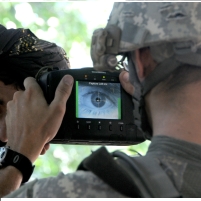FBI Prepares Billion-Dollar Iris Recognition Database
Sunday, July 08, 2012
 (photo: William Tremblay, U.S. Army)
(photo: William Tremblay, U.S. Army)
With at least 30 million surveillance cameras watching Americans every day, one aspect of the world of George Orwell’s dystopian novel 1984 has already come to pass, and more is on the way. In the next two years, for example, the FBI plans to test a nationwide database for searching iris scans to more quickly identify persons “of interest” to the government. The human iris, which is the doughnut-shaped, colored part of the eye that surrounds the black pupil, exhibits a pattern unique to each individual, just as fingerprints do, and iris recognition has been a staple of science fiction stories and films for years.
Iris scanning is part of the FBI’s Next-Generation Identification system, a multiyear $1 billion program built by Lockheed Martin and already well underway for several years, which will expand the FBI’s server capacity to allow for rapid matching not only of iris scans, but also of additional physical identifiers, such as fingerprints, palm prints and facial images. The FBI intends to test the system in conjunction with prisons, some of which already use iris scans to track prisoners and prevent mistakes of identification. According to the FBI, the time for urgent criminal fingerprint searches will eventually be reduced from 2 hours to 10 minutes, while the use of iris scans and other markers should ensure greater accuracy.
Although privacy advocates have little criticism of the use of iris scanning in correctional settings, the fact that the FBI and state prison officials are using a database owned and maintained by a private corporation, BI2 Technologies, gives many pause. Jennifer Lynch, a staff attorney at the digital rights group Electronic Frontier Foundation, points out that privately-run databases, including well-encrypted ones at banks and other financial businesses, have experienced serious data breaches exposing private customer information, and that leaks of fingerprints or iris scans would be potentially much more serious. “You can change your credit card data. But you can’t change your biometric data.”
And in light of the fact that the New York Police Department, in cahoots with major Wall Street banks and finance firms, used security cameras to identify Occupy Wall Street protesters, suspicions that iris scans might be used to target non-criminals who are disliked by powerful cannot be dismissed out of hand.
-Matt Bewig
To Learn More:
Eye on Crime: The FBI is Building a Database of Iris Scans (by Aliya Sternstein, NextGov)
Next Generation Identification (FBI) (Warning: if you visit the FBI website, it will track your IP address, your operating system, the pages you visit and the website you visited before going to the FBI website.)
- Top Stories
- Unusual News
- Where is the Money Going?
- Controversies
- U.S. and the World
- Appointments and Resignations
- Latest News
- Trump Goes on Renaming Frenzy
- Trump Deports JD Vance and His Wife
- Trump Offers to Return Alaska to Russia
- Musk and Trump Fire Members of Congress
- Trump Calls for Violent Street Demonstrations Against Himself






Comments